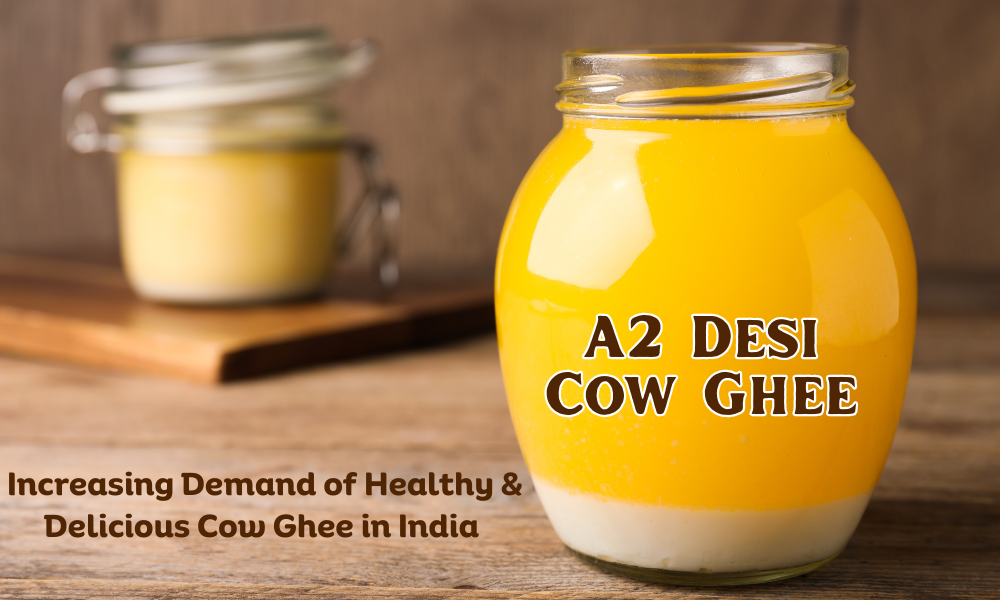A2 Desi Cow Bilona Ghee – Increasing Demand for Healthy & Delicious A2 Cow Ghee in India
The traditional clarified butter known as A2 Cow Bilona Ghee is created from the milk of native Indian cows that synthesize the A2 beta-casein protein. To make this ghee, you must first prepare curd, whisk it with a hand blender, and then gradually heat it until it becomes shiny.

This process enhances its digestion, fragrance, and medicinal qualities while maintaining its nutritional content. Originating from traditional Indian methods, this ghee distinguishes itself as a healthy, chemical-free substitute for factory-produced fats.
A Brief History of Tradition
In ancient India, ghee was revered not only in kitchens but also in temples, fire rituals, and everyday acts of blessing and sacrifice. Most ancient Ayurvedic texts refer to ghee as “amrit” (nectar) due to its balancing effect on all three doshas: Vata, Pitta, and Kapha.
In the past, every Indian household didn’t just consume ghee; they made it. Churning curd with a wooden bilona stick was often a community activity linking food preparation with prayer and patience. There was no hurry and no shortcuts.
Today, in an industrialized world where people seek whole and ethically produced food, A2 Desi Cow Bilona Ghee is not only reminiscent of the past but also a pathway toward conscious living.
Ayurvedic and Cultural Viewpoint
A2 Desi Cow Ghee has been used for generations as a traditional medicine and is more than simply a gourmet component in India.
Ayurvedic Ghee: It’s Not Just for Nutrition
Ghee holds a specific place in Ayurvedic philosophy, which views food as more than mere nourishment; it is a form of medicine. Made from the milk of indigenous Indian cows, A2 ghee is considered sattvic, promoting mental clarity, psychological wellness, and spiritual balance. However, its value extends beyond its soothing capabilities.
During Panchakarma (cleansing therapies), it is consumed to lubricate and prepare the body for deeper purification, applied to injuries and burns for healing, and blended with herbs for detoxification. Its ability to permeate tissues makes it an ideal carrier for herbal remedies, allowing them to penetrate deeper into the body.
Cultural Origins: Symbolic and Sacred
Ghee has long been symbolic in Indian culture, even beyond Ayurveda. Ghee is offered to the gods during religious ceremonies, weddings, and festivals as a representation of abundance and devotion.
Traditionally, a spoonful of ghee was essential for any auspicious meal. Bestowing ghee upon a newborn or a bride is considered a way to grant them strength, good fortune, and nourishment across many regions of India. This was more than just a custom; it was rooted in the understanding that ghee produces ojas, which is the Ayurvedic concept of energy and immunity.

Increasing Demand and Consumer Awareness
The rising demand for A2 Desi Cow Bilona Ghee in recent years has stemmed from a conscious shift in consumer perceptions of food rather than mere marketing tactics. Increasingly, pure, traceable, and traditionally prepared ingredients are valued as more people become curious about what they put into their bodies.
What’s Fueling the Increase?
The public’s heightened awareness of food quality, especially concerning dairy, is a key factor driving this growing interest. Nowadays, A2 ghee is viewed as a cleaner, easier-to-digest alternative to conventional ghee made from mixed or foreign-breed cow milk.
Beyond health enthusiasts, the discussion surrounding A1 and A2 proteins increasingly influences the dairy choices of regular consumers, affecting what they select from store shelves.
Moreover, the preparation process, known as bilona, has become synonymous with authenticity. Slow, manual methods are no longer considered outdated; instead, they are associated with integrity, skill, and care. This handcrafted approach stands out in an era when shortcuts and overprocessing are commonplace.
Change in Consumer Attitude
Today’s consumers are looking for products that align with a more holistic lifestyle rather than mere health benefits. A2 ghee is ethical, often derived from grass-fed cows, free from additives, and has Indian heritage, thus meeting multiple criteria. This trend is particularly driven by Gen Z and Millennials, who prefer brands that offer sustainability, transparency, and a story behind their products.
Homegrown brands emphasizing traceability—being able to identify the source of milk, how the cows are treated, and whether traditional practices are genuinely followed—are also gaining popularity. In the Indian food sector, this trust-based purchasing behavior is redefining “premium.”
Market Forecasts and Trends
Once a niche market, the A2 ghee sector is now experiencing broader acceptance. Over recent years, sales of A2 ghee have steadily increased due to rising urban demand, e-commerce platforms, and organic retailers enhancing visibility. According to industry analysis, A2 ghee is poised to play a vital role in the remarkable growth of India’s organic dairy industry in the coming years.
Local dairies and startups are capitalizing on this trend by offering small-batch, farm-to-home models that balance quality and convenience. Global markets are also expanding as Indian immigrants and health-conscious consumers seek alternatives to processed fats.
Conclusion
A2 Desi Cow Bilona Ghee offers more than just a nutritious fat by combining purity, nutrition, and history. As India rediscovers its roots, this ghee is being appreciated for its flavor as well as the considerable sustenance it offers to the body and mind. Its rising popularity is a reflection of a broader movement that emphasizes traditional customs, mindful eating, and stronger ties to our heritage. A2 ghee is not just a superfood but also a timeless emblem of wellness that has been passed down through the years as more people look for healthy, real food sources.
Author’s Bio
Author Nikita is professional content writer, she is always exciting to express thoughts & insights into wonderful words on various topics.















